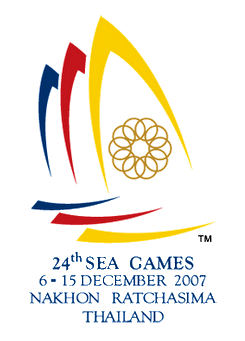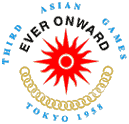
The Southeast Asian Games, commonly known as SEA Games is a biennial multi-sport event involving participants from the current 11 countries of Southeast Asia. The games are under the regulation of the Southeast Asian Games Federation with supervision by the International Olympic Committee and the Olympic Council of Asia.

The International Fitness and BodyBuilding Federation (IFBB), headquartered in Las Rozas (Madrid), is an international professional sports governing body for bodybuilding and fitness that oversees many of the sport's major international events, notably the World and Continental Championships.

Singaporeans participate in a wide variety of sports for recreation as well as for competition. Popular sports include football, swimming, track and field, basketball, rugby union, badminton, table tennis, and cycling. Many public residential areas provide amenities like swimming pools, outdoor spaces and indoor sport centres, with facilities for badminton, table tennis, squash among others.

The 2005 Southeast Asian Games, officially known as the 23rd Southeast Asian Games, was a Southeast Asian multi-sport event held in Manila, Philippines.
The 1987 Southeast Asian Games, officially known as the 14th Southeast Asian Games, was a multi-sport event held in Jakarta, Indonesia from 9 to 20 September 1987 with 30 sports featured in the games.

The 1989 Southeast Asian Games, officially known as the 15th Southeast Asian Games, was a multi-sport event held in Kuala Lumpur, Malaysia from 20 to 31 August 1989 with 25 sports featured in the games. It was officially opened by 9th Yang di-Pertuan Agong, Sultan Azlan Shah. Although Cambodia did not participate, Laos returned to compete for the first time under the new federation name in this edition of the games, while Vietnam fields their own delegation to the event for the first time as a unified country.

The 1991 Southeast Asian Games, officially known as the 16th Southeast Asian Games, was a multi-sport event held in Manila, the Philippines from 24 November to 5 December 1991, with 28 sports featured in the games. This was the second time that the country hosted the games and its first since 1981. It was officially opened by President Corazon Aquino at the Rizal Memorial Stadium in Manila through a colorful opening ceremony. It was the only SEA Games at that time where the overall championship was heavily contested. The deciding medal came from the last sporting event - women's marathon where Indonesia got the gold medal.

The 2003 Southeast Asian Games, officially known as the 22nd Southeast Asian Games, SEA Games 22 and also known as Vietnam 2003, was a Southeast Asian multi-sport event held from 5 to 13 December 2003 in Hanoi, Vietnam. This was the first time that Vietnam had staged the SEA Games, and it saw East Timor, which had just gained independence in 2002; although not being an ASEAN member and despite its geographical location closer to the Pacific archipelago than the Asian continent, making its debut at the games.

The 2007 Southeast Asian Games, officially known as the 24th Southeast Asian Games, was a Southeast Asian multi-sport event held in Nakhon Ratchasima (Korat), Thailand. This was the sixth time Thailand hosted the Southeast Asian Games and its first time since 1995. Previously, Thailand also hosted the 1959 inaugural games, 1967 games, 1975 games and the 1985 games.

The 1958 Asian Games, officially the Third Asian Games and commonly known as Tokyo 1958, was a multi-sport event held in Tokyo, Japan, from 24 May to 1 June 1958. It was governed by the Asian Games Federation. A total of 1,820 athletes representing 20 Asian National Olympic Committees (NOCs) participated in the Games. The program featured competitions in 13 different sports encompassing 97 events, including four non-Olympic sports, judo, table tennis, tennis and volleyball. Four of these competition sports – field hockey, table tennis, tennis and volleyball – were introduced for the first time in the Asian Games.

The ASEAN Para Games is a biennial multi-sport event held after every Southeast Asian Games involving disabled athletes from the current 11 Southeast Asia countries. Participating athletes have a variety of disabilities ranging from spastic, cerebral palsy, mobility disabilities, visual disabilities, amputated to intellectual disabilities. The ASEAN Para Games is under the regulation of the ASEAN Para Sports Federation (APSF) with supervision by the International Paralympic Committee (IPC) and the Asian Paralympic Committee and is traditionally hosted by the country where the Southeast Asian Games took place.

The 2013 Southeast Asian Games, officially known as the 27th Southeast Asian Games, or the 27th SEA Games, and commonly known as Naypyitaw 2013, was a Southeast Asian multi-sport event took place in Nay Pyi Taw, Myanmar from 11 to 22 December 2013, Around 4730 athletes from 11 participating nations competed at the games, which featured 460 events in 34 sports. The games were held from 11 to 22 December 2013.

Sports in the Philippines is an important part of the country's culture. There are six major sports in the Philippines: basketball, boxing, tennis, football, billiards, and volleyball.

The Philippines national baseball team represents the Philippines in international matches and tournaments. It is organized by the Philippine Amateur Baseball Association.
Bodybuilding was an event which took place at the 2006 Asian Games in Doha, Qatar on December 8 and 9. The competition included only men's events for eight different weight categories. All events were held at the Al-Dana Banquet Hall. Qatar finished first in the medal table by winning two goals.

The Philippines has competed in every edition of the Summer Olympic Games since its debut in the 1924 edition, except when they participated in the American-led boycott of the 1980 Summer Olympics. Filipino athletes have also competed at the Winter Olympic Games on six occasions since 1972.
Bodybuilding was one of the many sports which was held at the 2002 Asian Games in Busan, South Korea between 3 and 6 October 2002. The competition took place at Busan Citizens' Hall. The competition included only men's events for eight different weight categories. The host national South Korea topped the medal table by winning three gold medals higher than Singapore and Bahrain.
Bodybuilding in the Philippines refers to the bodybuilding sport practiced by Filipino bodybuilders in the Philippines to be able to compete in local and international bodybuilding competitions. According to Filipino sports reporter Bill Velasco of The Philippine Star newspaper, the Philippines has a "long-standing history of bringing glory to the Philippines".
Bodybuilding in Thailand includes Thai competitors representing their country at international events. Thai Bodybuilding Federation is the sport's national governing body.
Bodybuilding in Malaysia has featured one builder winning the Mr. Universe competition nine times. Malaysian Bodybuilding Federation is the sport's governing body in the country.
















